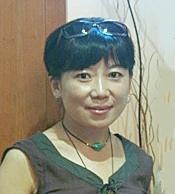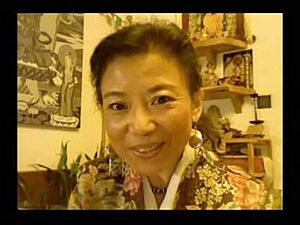Tsering Woeser facts for kids
Quick facts for kids
Tsering Woeser
|
|
|---|---|

Tsering Woeser on Voice of America's Chinese service
|
|
| Born | July 21, 1966 Lhasa |
| Occupation | Writer |
| Language | Chinese, Tibetan |
| Nationality | Chinese
|
| Alma mater | Southwest University for Nationalities |
| Genre | Short story, poetry, essays |
| Notable works | Notes on Tibet (Chinese: 西藏笔记) |
| Notable awards | Prince Claus Awards; International Women of Courage Award |
| Spouse | Wang Lixiong |
Tsering Woeser (born July 21, 1966) is a well-known writer, activist, and poet from Tibet. She also writes essays and shares her thoughts on blogs. Woeser is known for writing about Tibetan culture and history. She often writes in Chinese, which helps many people learn about Tibet.
Contents
About Tsering Woeser
Woeser was born in Lhasa, a city in Tibet. Her family has both Tibetan and Han Chinese roots. Her grandfather was an officer in the Nationalist Army, and her father was a high-ranking officer in the People's Liberation Army. When she was very young, her family moved to the Kham area in western Sichuan province.
Education and Early Career
In 1988, Woeser finished her studies at Southwest University for Nationalities in Chengdu. She earned a degree in Chinese literature. After graduating, she worked as a reporter in Garzê and later in Lhasa. Since 2003, she has lived in Beijing. She is married to Wang Lixiong, who is also a famous author. He often writes about Tibet.
Woeser's Writing and Activism
Woeser has written several books, including Notes on Tibet (Chinese: 西藏笔记; pinyin: Xīzàng Bǐjì). This book was reportedly banned by the government around September 2003. After the ban, Woeser also lost her job.
Online Presence and Challenges
Woeser continued to share her poems and articles online. She had two blogs. One blog, called Maroon Map, was mostly read by Tibetans. Her other blog was mainly for Han Chinese readers. In July 2006, both of her blogs were closed by the government. This happened after she posted birthday greetings to the 14th Dalai Lama and discussed other sensitive topics. Despite these challenges, Woeser has stated that she will keep writing and speaking her mind.
Advocacy and Recognition
During the events in Tibet in 2008, Woeser and her husband were placed under house arrest. This happened after they spoke to reporters. In December 2008, Woeser and her husband were among the first people to sign Charter 08. This was a document that called for political changes in China. Many thousands of people later signed it. The main author of Charter 08, Liu Xiaobo, was later awarded the 2010 Nobel Peace Prize.
In July 2009, Woeser and her husband also signed a petition. This petition asked Chinese authorities to release a detained professor named Ilham Tohti. In 2011, Woeser was given the Prince Claus Award. However, she was not allowed to receive the award at the Dutch embassy.
Woeser has also spoken about historical events. She defended Tibetan actions during the 1905 Tibetan Rebellion. She explained that Zhao Erfeng invaded the region to "brutally stop Tibetan protests." She also listed bad actions committed by Zhao.
Her work, "Garpon La's Offerings," was translated and included in The Penguin Book of Modern Tibetan Essays.
Awards and Honors
Tsering Woeser has received several important awards for her work:
- In 2007, she was given the Freedom of Expression Prize by the Norwegian Authors Union.
- Also in 2007, she received the freedom of speech medal from the Association of Tibetan Journalists.
- In 2010, the International Women's Media Foundation honored her with the Courage in Journalism Awards.
- In 2011, she received the Prince Claus Awards, which focused on "Breaking taboos."
- In 2013, Tsering Woeser was awarded the International Women of Courage Award.
Published Works
Woeser has published many works, including:
- Her first poetry edition.
- A book published by China Tourism Press in 2004, ISBN: 7-5032-2247-6.
- Tibet's True Heart. Selected Poems. published in 2008. These poems were translated by A. E. Clark.
- Forbidden Memory Tibet during the Cultural Revolution This English edition was published in 2020 by University of Nebraska Press. It includes photographs by Tsering Dorje and was edited by Robert Barnett.
See also
 In Spanish: Woeser para niños
In Spanish: Woeser para niños
 | John T. Biggers |
 | Thomas Blackshear |
 | Mark Bradford |
 | Beverly Buchanan |


